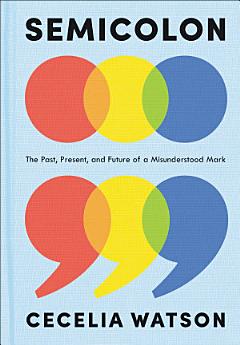Semicolon: The Past, Present, and Future of a Misunderstood Mark
Jul 2019 · HarperCollins
4.5star
2 reviewsreport
Ebook
221
Pages
family_home
Eligible
info
reportRatings and reviews aren’t verified Learn More
About this ebook
“Delightful, enlightening . . . The twisty history of the hybrid divider perfectly embodies the transience of language.” —Vulture
The semicolon. Stephen King, Hemingway, Vonnegut, and Orwell detest it. Herman Melville, Henry James, and Rebecca Solnit love it. But why? When is it effective? Have we been misusing it? Should we even care?
In Semicolon, Cecelia Watson charts the rise and fall of this infamous punctuation mark, which for years was the trendiest one in the world of letters. But in the nineteenth century, as grammar books became all the rage, the rules of how we use language became both stricter and more confusing, with the semicolon a prime victim. Taking us on a breezy journey through a range of examples—from Milton’s manuscripts to Martin Luther King Jr.’s “Letters from Birmingham Jail” to Raymond Chandler’s The Big Sleep—Watson reveals how traditional grammar rules make us less successful at communicating with each other than we’d think. Even the most die-hard grammar fanatics would be better served by tossing the rule books and learning a better way to engage with language.
Through her rollicking biography of the semicolon, Watson writes a guide to grammar that explains why we don’t need guides at all, and refocuses our attention on the deepest, most primary value of language: true communication.
“What? Sit on the beach reading about punctuation? Yes, when it’s as fun, rangy, and witty as this.” —The Philadelphia Inquirer, “Big Summer Books”
“A scholarly treatise on a sophisticated device that has contributed eloquence and mystery to Western civilization . . . Delightful.” —The New Yorker
The semicolon. Stephen King, Hemingway, Vonnegut, and Orwell detest it. Herman Melville, Henry James, and Rebecca Solnit love it. But why? When is it effective? Have we been misusing it? Should we even care?
In Semicolon, Cecelia Watson charts the rise and fall of this infamous punctuation mark, which for years was the trendiest one in the world of letters. But in the nineteenth century, as grammar books became all the rage, the rules of how we use language became both stricter and more confusing, with the semicolon a prime victim. Taking us on a breezy journey through a range of examples—from Milton’s manuscripts to Martin Luther King Jr.’s “Letters from Birmingham Jail” to Raymond Chandler’s The Big Sleep—Watson reveals how traditional grammar rules make us less successful at communicating with each other than we’d think. Even the most die-hard grammar fanatics would be better served by tossing the rule books and learning a better way to engage with language.
Through her rollicking biography of the semicolon, Watson writes a guide to grammar that explains why we don’t need guides at all, and refocuses our attention on the deepest, most primary value of language: true communication.
“What? Sit on the beach reading about punctuation? Yes, when it’s as fun, rangy, and witty as this.” —The Philadelphia Inquirer, “Big Summer Books”
“A scholarly treatise on a sophisticated device that has contributed eloquence and mystery to Western civilization . . . Delightful.” —The New Yorker
Ratings and reviews
4.5
2 reviews
About the author
Cecelia Watson is a historian and philosopher of science, and a teacher of writing and the humanities. She is currently on Bard College’s Faculty in Language and Thinking. Previously she was an American Council of Learned Societies New Faculty Fellow at Yale University, where she was also a fellow of the Whitney Center for the Humanities and was jointly appointed in the humanities and philosophy departments.
Rate this ebook
Tell us what you think.
Reading information
Smartphones and tablets
Install the Google Play Books app for Android and iPad/iPhone. It syncs automatically with your account and allows you to read online or offline wherever you are.
Laptops and computers
You can listen to audiobooks purchased on Google Play using your computer's web browser.
eReaders and other devices
To read on e-ink devices like Kobo eReaders, you'll need to download a file and transfer it to your device. Follow the detailed Help Center instructions to transfer the files to supported eReaders.




